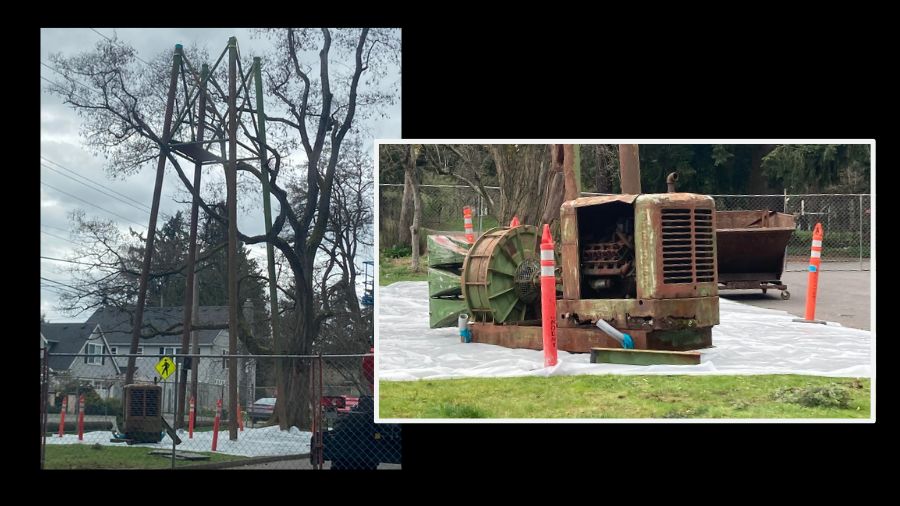Feds play blame game while closure of Seattle National Archives moves ahead
Jan 27, 2020, 12:49 PM | Updated: 1:45 pm

The National Archives in Seattle. (NationalArchives.gov)
(NationalArchives.gov)
KIRO Radio learned Saturday morning from Rep. Pramila Jayapal’s office that the federal Office of Management and Budget (OMB) has accepted the recommendation from the federal Public Buildings Reform Board (PBRB) to close and sell the Seattle facility of the National Archives. The records held there — some dating to the 1840s and all reflecting the history of the Pacific Northwest — will be shipped to Riverside, California.
In a statement, Rep. Jayapal said:
I’m deeply disappointed that OMB failed to heed bicameral, bipartisan Congressional requests to reject PBRB’s recommendation to sell the archives facility in Sand Point without engaging state and local officials and affected communities as required by law. The law requires PBRB to solicit critical local input when it considers closing federal government facilities that serve the public—and we must get answers about why the law wasn’t followed in this case.
The OMB decision, made without any input from the public or stakeholders in the four states that the Seattle facility serves – Washington, Oregon, Idaho and Alaska – came within hours of an effort by members of Congress from those states to intervene.
Late Friday, a letter to OMB director Russell Vought signed by all eight U.S. Senators from the four affected states – including Democrats and Republicans – expressed concerns about the recommendation, and especially about the process that did not consult public stakeholders, such as state historians and Native American tribes, and federal lawmakers in Alaska, Idaho and Oregon.
Also providing a statement on Saturday was Seattle City Councilmember Alex Pedersen, whose district includes the National Archives in the Sand Point neighborhood.
I am very frustrated and disappointed with the federal agencies advancing the sale of this important historical asset here in Northeast Seattle … I will continue to support the efforts of our congressional delegation to challenge and question the sale due to lack of notification, transparency, and public engagement as well as unanswered questions about the fiscal impact to the federal government.
Washington Senator Maria Cantwell said that she is working with “colleagues on options that would keep these vital documents in the Pacific Northwest where they belong.” Sen. Patty Murray also weighed in:
For generations, local tribes, historians, archivists, researchers, and more have used the vital records at Seattle’s Federal Archives and Records Center to help tell the story of the Pacific Northwest’s heritage and history, and I am deeply disappointed by OMB’s decision to approve the recommendation to close this important resource after a rushed and questionable process. I will continue working with my colleagues in the Senate, as well as local partners, on next steps to ensure all perspectives across the spectrum are heard as this process moves forward, and I am committed to ensuring that the records stored in Seattle’s federal archive remain accessible to local stakeholders to continue the critical work of making our history and culture accessible to families and communities statewide.
On Monday, KIRO Radio spoke with Public Buildings Reform Board executive director Adam Bodner. Bodner’s agency identified the Sand Point property and, Bodner says, worked with the National Archives and Records Administration to add it to the list of “high value assets” the federal government intends to sell as part of 2016 legislation to identify underutilized federal facilities.
Asked about the apparent lack of public process and lack of stakeholder input – particularly in wake of vigorous public outcry since the list was first reported by KIRO Radio on January 15 – Bodner said that was the decision of the staff of the National Archives and Records Adminstration (NARA).
“We proposed that property to NARA [National Archives and Records Administration] as a potential because it appeared to be underutilized, and it’s in a area where the property itself would be very valuable,” Bodner said. “And they consented that they had the ability to relocate those files, or they felt that relocating those files was appropriate, and keeping them in the current facility, which is extremely in poor condition and expensive to operate and maintain, made good sense to them.”
So why not let the public and other stakeholders in the four states served by the facility have their say as to whether the Seattle National Archives is actually “underutilized”?
“I have to refer you to them for the rationale for that decision,” Bodner said.
KIRO Radio has reached out multiple times via email and phone to John Valceanu, National Director of Communications and Marketing for the National Archives and Records Administration in Washington, D.C.
Short of a brief email last week saying that he did “not have any comment at this time, as we await the Office of Management and Budget to make the final decision on the Public Buildings Reform Board’s recommendations,” NARA has ignored KIRO Radio’s request for comment on the process, the selection of Seattle, and the lack of public and stakeholder input.
Meanwhile, Bodner said that none of the other properties on the list approved by OMB over the weekend have generated the kind of public response to the recommended closure and sale of the National Archives facility in Seattle.
UPDATE: We have received a statement from NARA which you can read in its entirety below:
The National Archives and Records Administration (NARA) facility in Seattle, WA, has been approved for eventual closure and sale. The facility was recommended for sale by the Public Buildings Reform Board (PBRB) and approved for sale by the Office of Management and Budget (OMB) through the authorities and process established in the Federal Asset Sales and Transfer Act of 2016, as amended (FASTA).
A specific date has not been set for the closure of our Seattle facility, and we are not taking any immediate actions that will impact our customers. We expect the entire process of sale to take approximately 18 months and we have requested to stay in the building for an additional three years following the sale. We will continue to offer all services and maintain our current operating hours for the immediate future. We will communicate with our customers and stakeholder organizations when we have more information and as we develop our plans. We will also seek to include input from our stakeholders in order to inform our plans and decisions.
When we eventually close our physical presence in Seattle, we will continue to provide public access to our archival records. Some of our most popular records have been digitized and are available online. Members of the public can request copies of any available archival record (digital or analog) by email, telephone, or in writing. These records will also be available for in-person access in the research room at their new location. We are planning to expand our digitization efforts to make more records available free of charge and regardless of location.
We recognize that the closure of our facility will have a negative impact on researchers, Federal agencies, and other customers that use our facility. As we begin planning for the eventual closure of the facility, we will engage with local researchers and other stakeholders to find opportunities to smooth the transition for the public, support Federal agencies and the local researcher community, and ensure continued access to our records after the move.
Follow @https://twitter.com/feliksbanel













